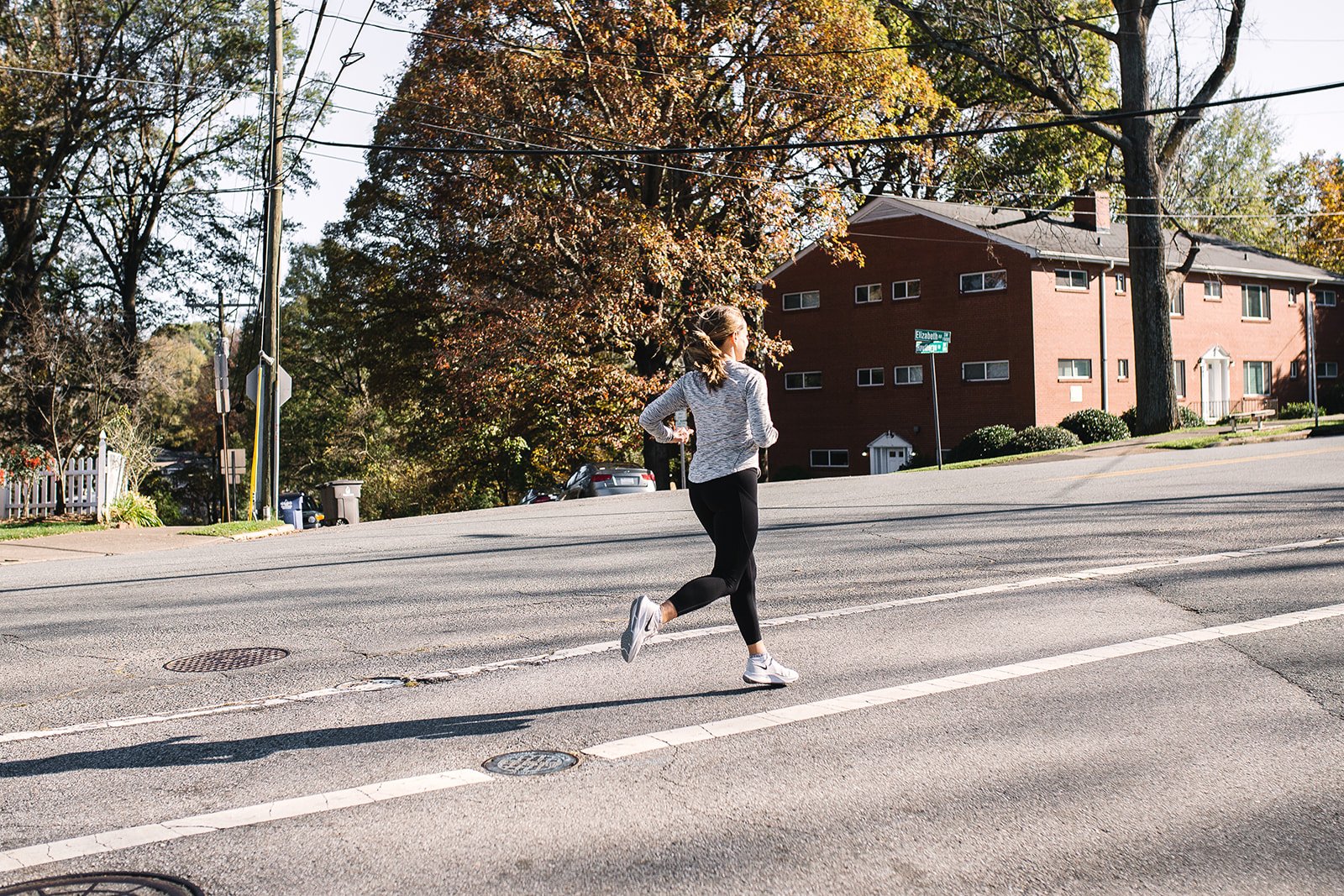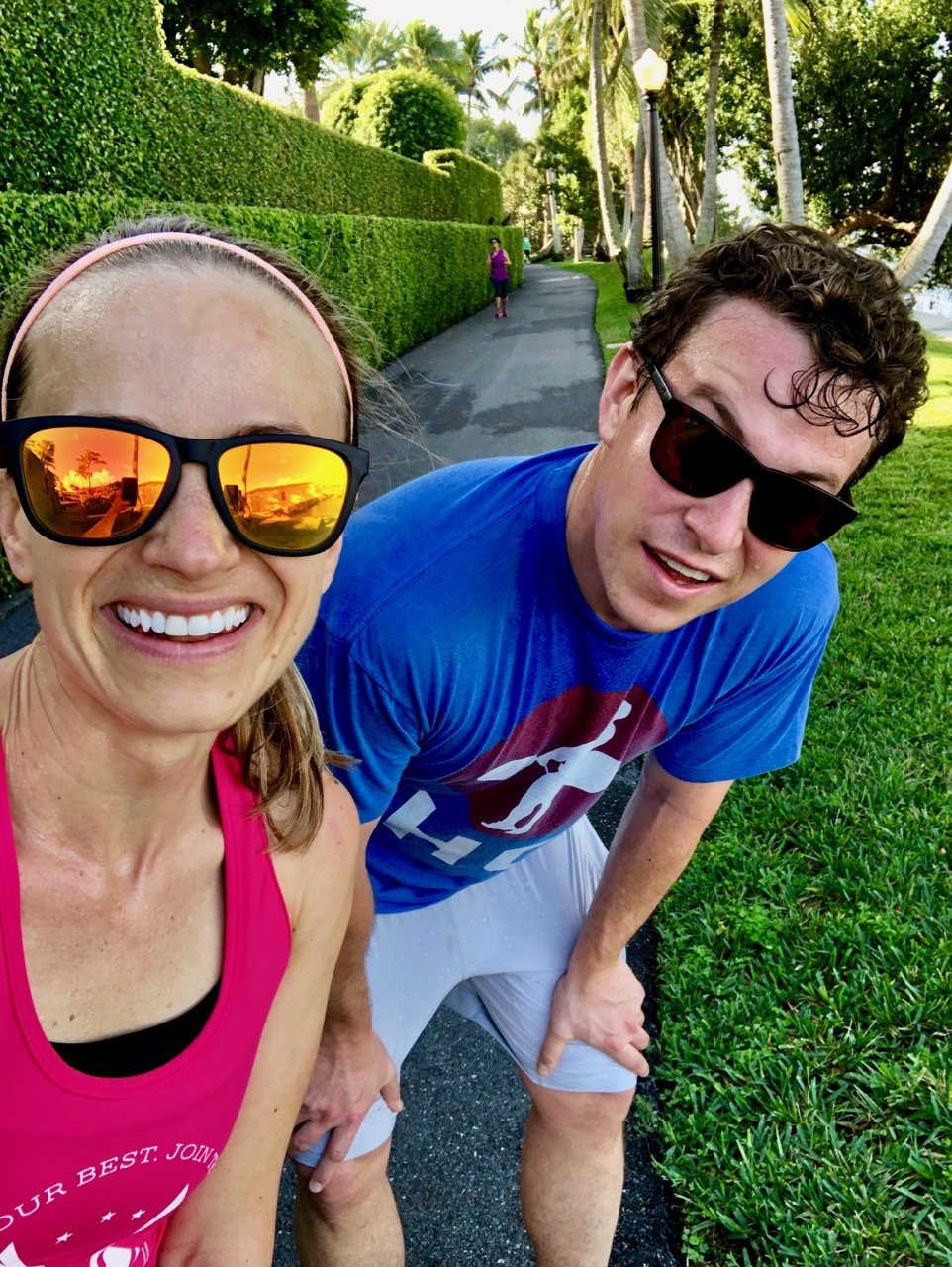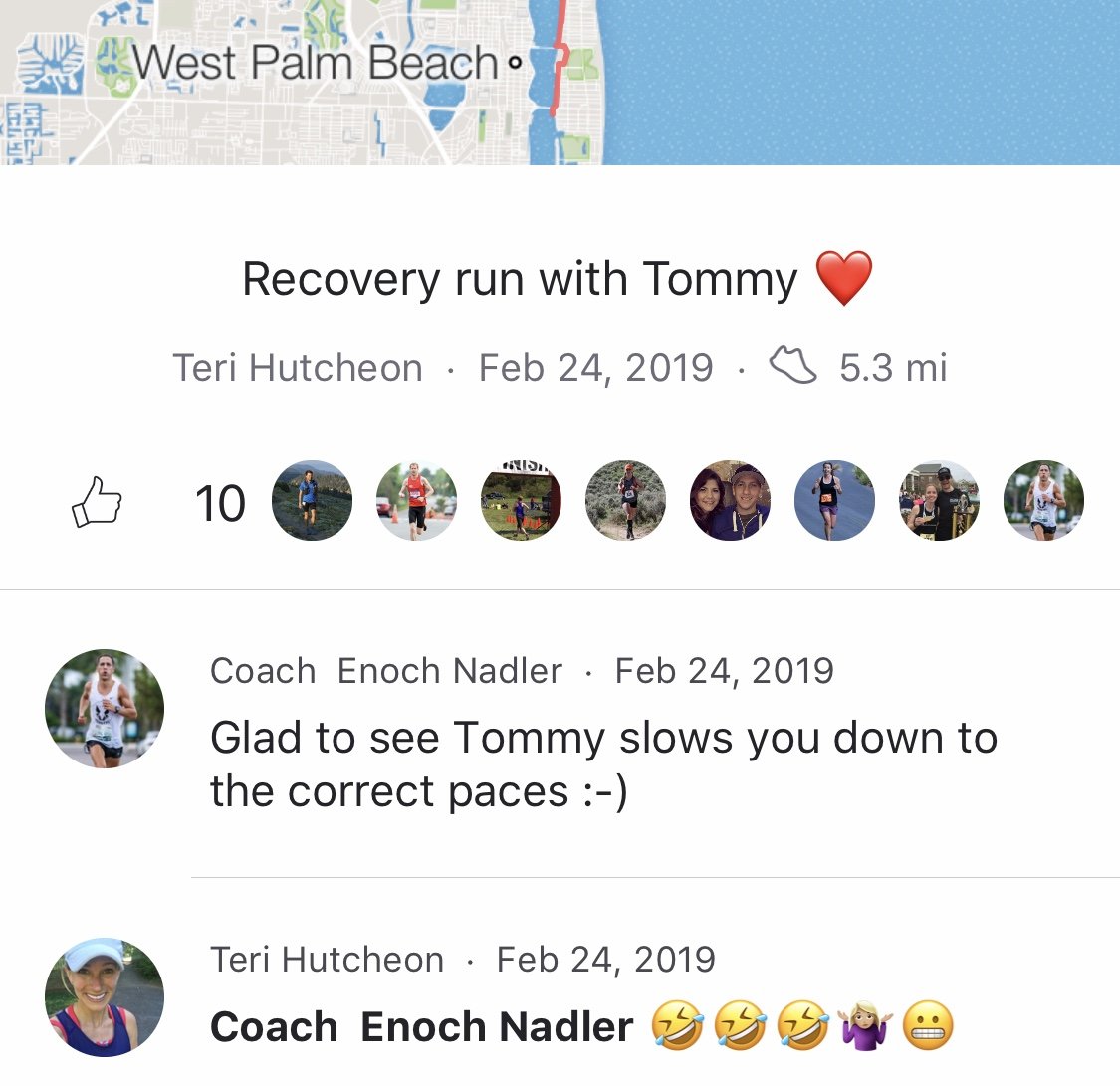


Recovery runs are a vital part of training if you want to improve your running. Learn why they’re important and how slow you should run them!
One of the first things I noticed after I started working with a running coach for my marathon training a few years ago was the number of recovery runs on the schedule. And the first thing I started hearing repeatedly from my coach was to slow down on those recovery runs. And to slow down a lot.
When I’m in marathon training mode, my training plan has 3-4 recovery runs per week. That means the bulk of my training and miles are done at slower paces. Hard, high intensity workout runs are a much smaller amount of the work. Why? In order to nail the intense workouts, it’s important to run easy the other days.
Running at a conversational pace means your body isn’t constantly being pushed. And that’s important so you feel fresh on your hard days and can REALLY push hard. That’s part of what will help you improve your running. If you’re worn out by your day-to-day training, you won’t make improvements in speed or endurance. And you certainly won’t be able to run longer and stronger each time.
In this post, my running coach is sharing all about the benefits of recovery runs and how slow you should really be going.



Benefits of Recovery Runs
I asked my coach Enoch Nadler, an elite runner, to further explain the real benefits of recovery runs since I’m more likely to do something if I understand why. I’m sharing what he shared with me!
Over to you Enoch!
—
The number one mistake that runners make is going too fast on their easy days. Most runners think that you need lots of speed work, tempos, fartleks or even hills to run faster. And don’t get me wrong, these are important. But in reality, developing the aerobic system is the single most important factor for long-term development and improvement. Here are a few reasons you should run your easy days easy.
Recovery runs should be completed at a pace of around 55-75% of your 5k race pace (think 2-2.5 min slower than 5k race pace). This pace is ideal for mitochondria and capillary development.
Mitochondria is directly responsible for creating energy for your muscles. Recovery runs increase both the number and the size of your mitochondria in your muscle fibers and increase blood flow to the legs.
Next, capillaries are responsible for delivering oxygen to your muscles and clearing out waste that is produced from exercise. Running at this easy pace increases the number of capillaries per muscle fiber. This directly correlates to how efficiently you deliver oxygen and clear out waste like lactic acid.
When you run faster than this ideal range, your development of the aerobic system is greatly diminished. Yes, diminished. That means it will be harder to become a better runner who can run faster and longer.
Aerobic development is important from the mile to the marathon. The marathon is around 97% aerobic, which comes as no surprise. But even the mile is 80% aerobic, making slow runs vital for running fast. All these easy runs add up to running faster across all race distances!
If you’re not training for a specific race, base training is a great time to work on aerobic development. Base training should also be done at a slower pace.
Recovery runs make up the majority of the time we spend running. All this time adds stress to your bones, ligaments, tendons, and muscles. When you run faster, not only do you decrease aerobic development, you also increase the strain on your body, leading to more injuries.
Recovery runs also serve as active recovery from hard workouts and races. If you run too fast on these runs, you won’t recover and will soon fatigue and break down.
The stress and fatigue compound so we often think a certain workout or race causes injury. In reality, it’s often the cumulative effect of not recovering on our easy days.
—
Thanks Enoch!! Let’s all read that last sentence again, shall we?
Remember, recovery runs should be run at 55-75% of your 5k race pace. That’s 2-2.5 min slower than your 5k or 10K race pace. There are a few other ways to help you run slow enough.
Or, skip a workout. You’ll be okay if you go 24 hours without working out. Enoch often reminded me that I am much more likely to run a race PR if I show up to the start line healthy. And if I don’t take rest days, I’m much more likely to get injured.
Running my easy days truly easy was one of the main ways I stopped getting injured so often. If you aren’t injured, you can continue to train and improve. Returning to running after an injury or time off will set back your training. So if you want to improve, don’t get injured in the first place! Yes, I know faster running is often more fun — I agree! — but you’ll become a faster runner by running more slowly the majority of the time.
Don’t believe me? Even elite runners run much slower on their easy days. Many have shared their recovery runs are 3-4 minutes slower than the pace they run to win races. If they can slow down, you can too.
So, what does that look like in practice? Below is a sample week from my marathon training when Enoch trained me for the 2019 Boston Marathon, where I set a big PR. Tommy and I were on vacation in Palm Beach, FL and it was great to have him along for some training. (These photos make me miss traveling and running in warm temperatures!)
Note all the recovery runs! I was running easy 4-5 times a week.
M – Double Run Day, 11.3 total miles
T – 65 min recovery run + strides, average 8:08 pace
W – 95 minute long run, recovery, average 8:30ish pace
Th – 55 minute recovery run, 9:07 pace
F – 3 x 7 min with 2 min jog, then 6 x :15 hills + warm-up & cool down
Sa – 30 minute run with my husband, 9:03 pace
If you struggle to slow down on your recovery runs, run with someone who is slower than you to hold you accountable! You don’t want to be the jerk who leaves them behind, right? Right. Plus, running with a friend or someone you love, is a lovely way to spend time together (and helps keep your recovery process on track), You never know if you’ll inspire them to stick with it – Tommy ran his first half marathon later that year!
Su – 45 recovery run with Tommy, 8:40 pace

My coach sent me the comment below on Strava, and he re-iterated it again via text saying he really likes when I go slower on my recovery runs. Thanks Tommy! 😉

One of the biggest things I’ve learned over the 20+ years I’ve been running is listening to my body and knowing what it’s telling me. Some days my recovery runs feel great at an 8:00 pace. Other days, I’m closer to a 10:00 min pace.
For me, the biggest thing I focus on is effort. It should feel like recovery with nothing being forced. It’s one of the reasons I like doing my recovery runs solo since it lets me listen to my body and adjust as necessary. The first few miles are generally a slog and it’s important to let my body have that. And if I don’t, Enoch lets me know. ha!



Leave a Comment
12 responses to “The benefits of recovery runs and how slow to go”
So helpful to read this!! I am amidst training for a half marathon. Not my first but definitely my most focused training season. I never put much thought into recovery runs! It’s such a HUGE challenge to slow myself down. Switching up shoes after reading one of your previous posts was super helpful. I accidentally wore the wrong shoes for a recovery run recently and really struggled slowing my pace in them. My current schedule includes about two recovery runs per week. Thanks for helpful advice and info! So glad I found your blog ?
So helpful to read this!! I am amidst training for a half marathon. Not my first but definitely my most focused training season. I never put much thought into recovery runs! It’s such a HUGE challenge to slow myself down. Switching up shoes after reading one of your previous posts was super helpful. I accidentally wore the wrong shoes for a recovery run recently and really struggled slowing my pace in them. My current schedule includes about two recovery runs per week. Thanks for helpful advice and info! So glad I found your blog
Great info!! Do you look at your heart rate for recovery paces at all? I struggle with having my heart rate get kind of high when I run and I always wonder what othe runners average!
I check it sometimes but I don’t do specific heart rate training! I think on my recovery runs it’s somewhere between 130-150!
I am the worst about taking it easy on my runs, and now I’m injured of course. It’s just hard because I only have a limited amount of time (before the kids are up), so I feel like I need to maximize the distance. Guess I’ve learned my lesson now though. Hearing why it is important is very helpful, thank you! And yes, definitely interested in the Tommy story!
Teri, I would love to hear you talk more about GI distress. If I drink too much water, I sometimes have issues, but then I’ll also have issues for half a day on Saturdays when I do my long runs. It’s GI distress roulette. I never know when and why I’ll get it. 🙂 A blog post on this topic would be awesome!
I used to have issues ALL the time and it’s more rare these days — usually gluten and dairy trigger it. But I’ll add it to my to-blog list!! My best friend is also a sports nutritionist (getting his Ph.D!) – I’ll hit him up for some info on it too!!
That would be awesome! Also, LOVED the Tommy Twitter timeline. He definitely needs to guest post on here with his running updates. After reading that, I feel very committed to his training now haha.
I just read the twitter thread about your husband’s running and it is hilarious. Please do a full post about this! Also it reminds me of when my non-runner husband trained for a 10K and insisted in buying a variety of Gu’s even though I insisted they were not necessary for a 10K. He never used them in actual running but would eat them around the house as a snack. LOL men…
omg hahahaha that’s HILARIOUS. If Tommy knew that GU’s were a thing, he’d do the same thing. And the Skratch chews taste just like candy. I need to get Tommy to do guest blog post for us. 😉
Hi Teri! I read your blog all the time – and totally relate to your topic of keeping easy days easy. I tend to go just a liiiittle too hard, and end up fatigued. I’m also curious as to whether that type of training lends towards anemia more than the recovery-focused running. Does Enoch have anything to say about that? (Fellow FL and Gator grad here – love Enoch! He is great).
I actually wanted to ask you if it would be possible for you to share a quick survey. I am working with a baby startup that is creating a marketplace platform to better connect runners with coaches, and other secondary healthcare providers that have running-specific expertise. We are starting with some market research, and would love for any help I can get. The link is https://www.surveymonkey.com/r/9DKWNLW and anyone who takes it, shares on social media, and adds hashtag #arrowrun19 can win one of four $10 Amazon giftcards. Any help would be appreciated so much 🙂
I use a fitness tracker to measure my heart rate on runs. It’s so important to slow down and listen to your body for recovery runs. Great tips, thanks!